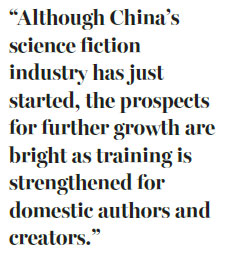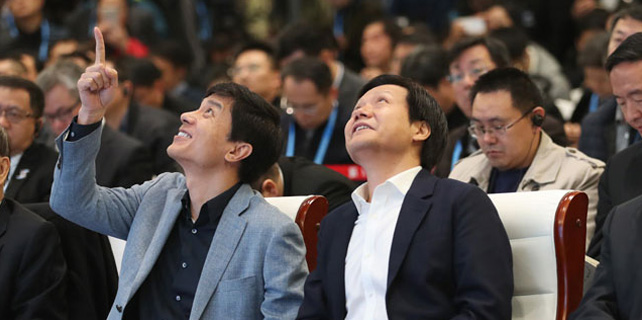Prospects bright for China's sci-fi industry
International audiences are being targeted as training is strengthened for domestic authors and creators
The Chinese science fiction industry has just begun, but there is plenty of space for further growth and development in the future.
The total output value of China's sci-fi industry reached about 10 billion yuan ($1.5 billion; 1.3 billion euros; £1.1 billion) last year, a year-on-year increase of 13.8 percent.
The gross output value of the sci-fi reading market was 1.32 billion yuan last year, an increase of about 6 percent compared with the previous year. Based on the fixed cover price, the inventory of new sci-fi books was more than 700 million yuan, and that of journals and magazines nearly 20 million yuan. Additionally, the market for various kinds of digital sci-fi reading exceeded 20 million yuan.
The development of the sci-fi reading market showed the following characteristics:
Paper publications continue to dominate and are the major growth point of the sci-fi reading market. Only a few new sci-fi releases issued digital versions at the same time as paper books. Young Chinese readers - especially those born after 1990, who are habitual digital readers - have found it difficult to find enough digital science fiction works.
Adult readers were eager to read excellent works but found there were not enough. Although famous writers such as Han Song, Wang Jinkang and He Xi have published new works, on the whole, outstanding stories are lacking. The quality of newly published stories does not compare with some old ones, so how to improve the quality of stories remains a key problem.

A sci-fi book market for young people and teenagers, although neglected for many years, is gradually forming, and teenagers have become the mainstay of science fiction reading.
The business of book copyrights tends to be stable. Because of the popularity of sci-fi reading and high expectations for the nascent Chinese sci-fi film market, science fiction copyrights have risen sharply in recent years. However, such business has cooled down since last year, since it is difficult to make some works into films or television programs, and there is a shortage of funding.
In 2016, the total box-office of sci-fi films in China was 7.64 billion yuan, an increase of 13 percent over the previous year. Of this amount, domestic sci-fi movies accounted for 3.5 billion yuan.
Imported science fiction films continued to dominate Chinese cinema screens, but domestic films began to show a strong performance, with some Chinese original sci-fi films achieving success at the box office. Chinese micro sci-fi films, such as Waterdrop, began to win people's attention and trigger hot discussion and philosophical reflection. Some original fantasy films, the subject of huge investment, began to combine with sci-fi films to form a new genre - science fiction-fantasy.
A total of 235 online drama series were launched in 2016, with views reaching 500 billion, and users' online payments rose to 11.7 billion yuan. Online sci-fi dramas, especially those with big budgets and investment, were highly welcomed by new media platforms and websites. However, even though the number of new sci-fi dramas was huge, the quality of some was not excellent.
There were no statistics available on video games in China, but global sales of video games stood at more than $444 million (377 million euros; £332 million) in 2016.
Startup enterprises related to sci-fi production also developed well. Newly started businesses were trying to find their places through competition and cooperation. For example, many enterprises were trying to recruit and attract more science fiction creators and authors through soliciting articles or hosting awards ceremonies. Famous events such as the Galaxy Award and the Xingyun Award have showed strong brand effect and received much attention in the sector.
In addition, some domestic publications and organizations are dedicated to introducing excellent Chinese sci-fi to international readers, promoting international exchanges and training creators. For example, Science Fiction World and China Educational Publications Import and Export Corp have cooperated to promote Chinese sci-fi author Liu Cixin's Three-Body trilogy to the world. The trilogy has been published in 13 languages, with total global sales of 800,000 copies. More Chinese works are being prepared for international readers.
Future Affairs Administration, a technological and cultural company, produces original content with a futuristic vision for Chinese science fiction. Its core business is development of science fiction writing, and it has begun cooperating with the University of Kansas in the United States to promote communication and exchanges between Chinese and US sci-fi writers.
Although China's science fiction industry has just started, the prospects for further growth are bright as training is strengthened for domestic authors and creators. The country, businesses and readers are all optimistic about the genre of literature and eager to see more impressive stories.
The author is a professor of humanities and director of the new Research Center for Science and Human Imagination, Southern University of Science and Technology.
The views do not necessarily reflect those of China Daily.
(China Daily European Weekly 12/22/2017 page8)


















